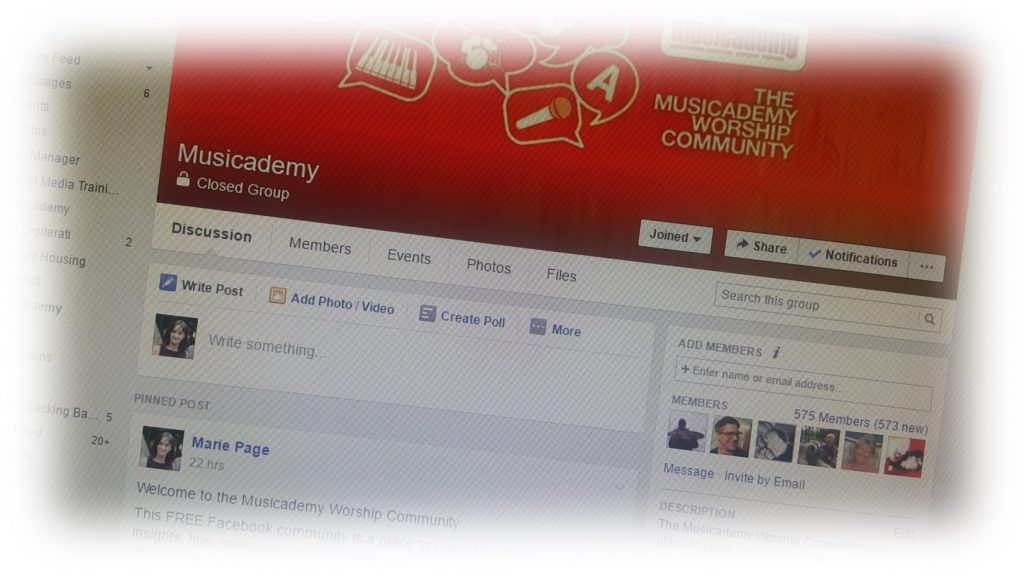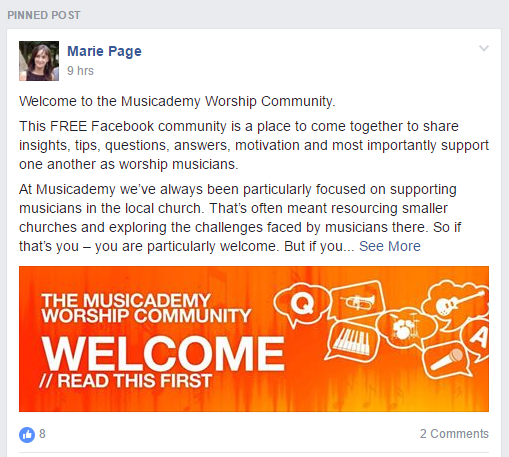How and why a Facebook Group might be the answer to your reach problem
I’ve lost count of the number of times Carlton and I have said to people over the last year that if you’re not paying for reach on Facebook you’re wasting your time.
I’m astonished by the number of organisations that are still doing Facebook marketing like it’s 2009.
It’s not just that reach is so much more challenging than before, engagement is more elusive too. Where previously people were merrily liking your content and commenting away, the trend now is for a far more guarded response. Facebook is calling it “context collapse” and, according to a Bloomberg report as examined in The Independent the team at Facebook HQ are busy dreaming up new ways of encouraging “personal sharing” (we discovered one of these only this week and reported it here).
So I’ve spent the last few weeks immersed in researching how to:
(a) Improve reach without paying for ads
(b) Best improve reach by boosting or promoting posts
(c) Improve engagement (which inevitably drives better reach)
The results of my learning from (a) are going to be channelled into an online course and accompanying e-book that we’ll be releasing in the very near future. For (b) that’s an ongoing experiment – I’m still finding that boosts perform better than promoted posts or ads and for (c) well I’ll share a lot of that good practice in the upcoming course and book, but do read on as I’ve found the ultimate engagement machine for 2016. The overwhelming upshot of all my research is actually to forget the Facebook Page and instead focus on Groups.
If you’ve followed my writing over the years you’ll know that I rarely preach advice without having tried and tested it on my own sites, and this advice on Groups is no different. So here is the story of how in a single day I created a Group from scratch that resulted in a membership of 600 and more engagement than I’ve EVER seen in an equivalent Facebook Page. Within 24 hours of launching the Group we had nearly 600 members, 87 new user created content threads, each heading up a lively discussion plus an additional 58 comments in an “Introduce Yourself” thread.
Facebook Page vs Facebook Group
The team at Musicademy have worked hard building a vibrant Facebook Page over the years. With nearly 15,000 fans and a lot of effort, we enjoy well above the average reach. But it really is hard work nowadays and if we want to guarantee something is seen by a majority of fans we need to boost content.
Musicademy is what I’d describe as a “passion brand”. It’s for church based musicians and is designed to raise awareness of Musicademy’s training DVDs and online courses in good old content marketing fashion. We share our own original content – blog posts and the like – as well as curated content from other relevant websites.
We’ve found it increasingly challenging in recent years to generate buzz around topics we introduce. Questions that previously would have garnered lots of responses seem to fall flat – due, I think to lower reach levels and also the aforementioned context collapse.
But I have observed what I can only describe as MASSIVE engagement on other Facebook Groups I’m part of. It helps no end that notifications are by default turned on for new members of Facebook Groups, and the Facebook algorithm, responsible for crushing so much of your Page’s organic reach, does not effect Group posts.
I figured that with a passion brand like Musicademy it should be possible to generate far better levels of engagement if we could only persuade people to follow us in yet another context. They are probably already on our newsletter mailing list, fans on Facebook, possibly also Twitter followers. Would they really cope with yet another channel? And would they just be wary of a possible duplication of content – the same messages being thrown at them in another medium?
Developing a Facebook Group from scratch
We decided to throw the question out to fans of the existing Facebook Page and was astonished at how positive a response we received. In fact, it had more reach and engagement than anything else on the Page (other than viral funnies) for years!
Clearly we were scratching where folks were itching.
We made it clear from the start that the Group would not be a duplication of what is on the Facebook Page. What we wanted to build was a community with peer-to-peer support. Sure the Musicademy team would be around to facilitate and answer questions, but my vision was for a Group that would have a life of it’s own and generate a lot of it’s own activity.
There are a lot of worship and music Groups on Facebook already, so in planning what we would do with the new Musicademy Group we needed to think about how to differentiate from those, and also create some unique angles to keep things fresh. So over the next few days I set to dreaming up a structure for posting (I think Groups should be very different to Pages – it’s not about the admins doing all the work, it’s about facilitating the members) so I came up with some theme days – every Tuesday, for example, we’ll ask people to share their top tips for worship related tools: Tuesday Toolsday – geddit? [Actually, I nicked that idea from another Facebook Group I’m part of – it’s an entirely different sector so I think that’s fine].
Naming the Group and commissioning graphics
We wanted to hit the ground running with launching the new Group in a polished manner so pushed hard on essential pre-launch activity. We decided on a name. The two top options were “The Musicademy Green Room” and “The Musicademy Worship Community”. We went with the latter because with the focus on community, it better encapsulated the culture of what we wanted the Group to actually be. We commissioned the design of a cover image along with graphics for the theme days.
Do watch the cover design size specs – cover image size and formatting best practice is not the same as for Pages. There’s not a lot online or even on Facebook’s own help pages with guidance on optimum size. We found that 1602 x 500 was ideal but as you’ll see from the screen grab above, we have positioned the text very centrally to avoid nasty cropping on mobile.
Writing the rules of behaviour
Aware that many Facebook Groups suffer from members thinking that dumping promotional links into posts is acceptable behaviour, I wrote a set of rules that laid out how to behave in the Group. Again I researched what other successful Groups were doing elsewhere and borrowed from their rules, adapting a few ideas of my own that were relevant to the kind of issues I felt might arise from the Musicademy client group. I also chatted with a moderator of another Group in the same sector to understand the problems they had faced with inappropriate behaviour.
Building the Group
It’s really easy to create a new Group on Facebook. Selecting to have a Private rather than Public Group (so people have to apply for membership before getting access to any of the content), I allocated Admin roles to our Musicademy team members, drafted a Description, added some tags and wrote up a welcome message which communicated the vision and purpose of the Group, introduced the team, gave links to our website and crucially, provided a link to the rules. This welcome message is pinned to the top of the timeline and has an eye-catching graphic that asks people to “Read This First”.
Launch day
We decided to drip out the launch activities over a couple of hours. Firstly I posted the link to the Group in the thread of the Facebook Page conversation from the previous week where we’d canvassed opinion about the viability of a Group. These early adopters were great to get into the Group as it’s first members as they had already demonstrated their eagerness to get involved, and willingness to speak up. Once a few had requested membership, I accepted them then tagged them in a Group post and invited them to introduce themselves. We were rolling.
I then created a new Facebook post on the original Page announcing the Group and boosted it to fans. We soon started to see new members coming in from all over – the UK, Malta, Singapore, India, Australia, South Africa, New Zealand, Canada and the US. I made a particular point of welcoming people from “new” countries and tried to find a either a common connection with them or asked them something relevant about their country.
Next, using the new Group graphics, I created a email which I sent to all 40,000+ people on the Musicademy mailing list.
That’s when the everything started going just a little bit crazy. Within a few hours I’d received hundreds of membership requests. I created a new thread welcoming people (often tagging by name) and inviting them to introduce themselves. I tried to individually respond to each introduction with a personally composed welcome that reflected something back of what they had told me. I looked for common ground – if they lived nearby I mentioned it, if I recognised the person from comments they had previously made on the Musicademy Page I thanked them for their involvement previously. Lots of people shared about their church or work situations and I encouraged them to tell us more in future days.
Inevitably there were a few people posting links to their own “stuff”. This is against the rules but clearly I didn’t want to embarrass people by giving them a public telling off. So I welcomed them, and gently suggested that our “Friday Free For All” would be a better place to post links in future. This seemed to be pretty well received and many actually edited their posts to remove the links.
I launched on a Saturday morning. Saturday made sense for Musicademy as a B2C brand. I wasn’t really expecting to be at my desk all day but that was certainly how it turned out. I wanted to promptly add people to the Group within seconds of them applying, and of course I was wanting to do the individual responses to their introductions. Here’s how one of those looked (check out whose Dad this guy goes to church with!):
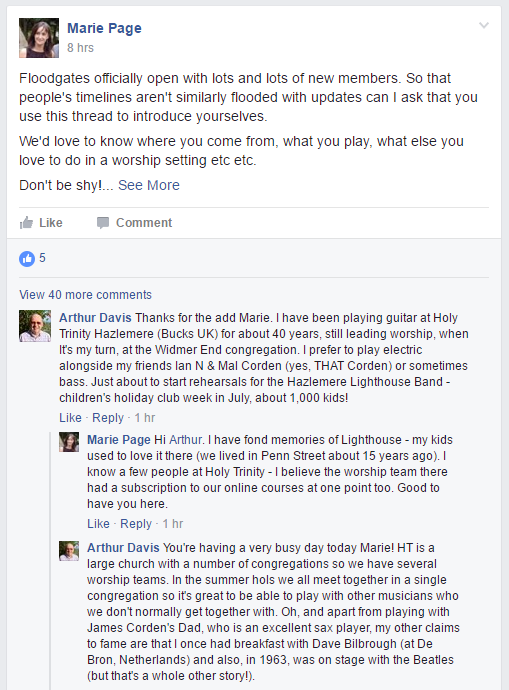
Posting as yourself
On a Page you get the option to post as the Page or as yourself (i.e. your Profile). In Groups you have to post as yourself. And I love that. It instantly feels more connected for people. You’re no longer hiding behind a brand, but posting using your own profile picture and name. It goes without saying to make sure that your profile picture is on-brand! And it may also be a good idea to go through your timeline and check that any of your public posts (i.e. those with the little globe symbol at the top) are appropriate for the wider world to see. If you’re not sure how your timeline looks to a non friend, create a temporary fake profile and take a look. You might be quite surprised at what surfaces.
User generated content
The magic of an engaged Facebook Group is the user generated content that materialises. Here are just two examples from the first day of the Musicademy Group:
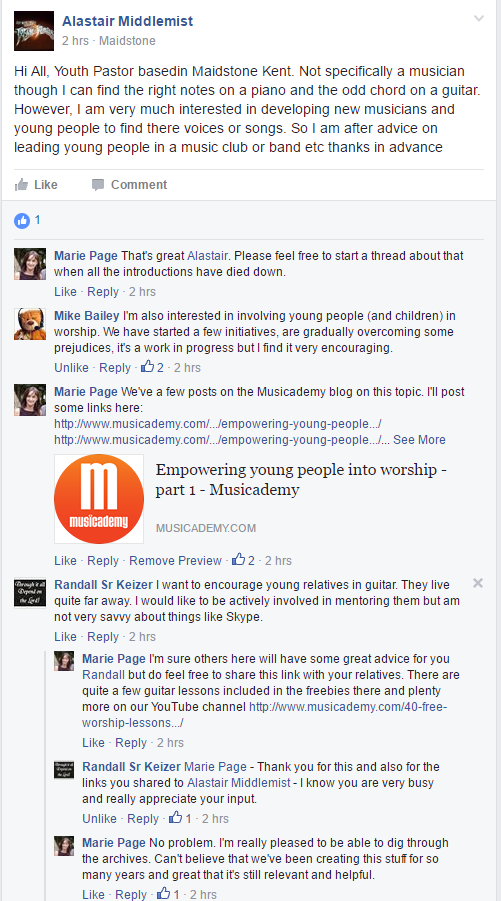
There are a few best practice things to observe here. Firstly, note my gentle encouragement to the user to create some content in a future thread about a topic he was interested in. And then when it became clear (as with Mike Bailey’s comment) that there was some traction here, I dug back through our archives and found some relevant blog posts. Content marketing is so sweet – posts we had written in 2009 still doing their qork.
Another user – Randall then very sweetly thanked me for finding the time to share the links and I again was able to weave in some Musicademy content – this time our “Lead Magnet” where we give away 40 free lessons when people sign up for our mailing list.
In another example (see below) Debi asks a really great question but I could see that it was falling down the timeline amidst all the introductions that were flying in. So to bump it up to the top again, I made a comment and was pleased to see that another user (Simon) was able to answer the original question with a useful link.
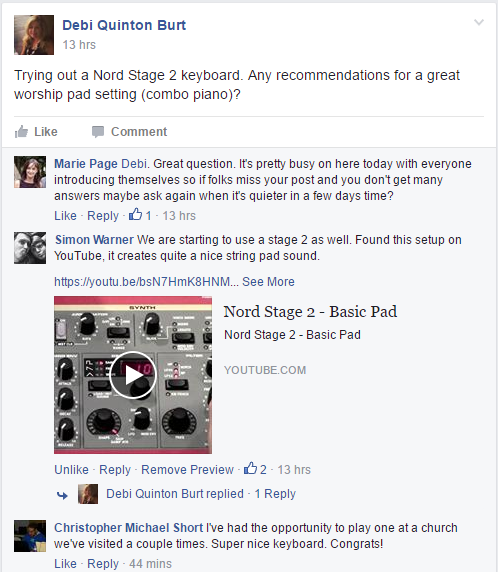
What have I learnt?
Well loads. Firstly, I am super motivated about my Musicademy community again and I feel re-energised in our Facebook marketing approaches. It’s so rewarding to see your efforts on social media being recognised by your followers and it gives me a huge buzz to see them commenting and supporting each other.
Providing timely responses to people that show care and attention is time consuming. It helps to have a broad team to share the load. A virtual assistant in another time zone would also be really useful so that there isn’t a dead 8 hours while the main admin team are offline each night.
I’m also learning about facilitating a community. Obviously I’ve done that in multiple guises over the years, but each is different, and this juggernaut of a new Group is going to throw up some challenges I’m sure. I’ll be blogging about it as I go and may well create a Facebook Groups Best Practice course and book for Digiterati folks too.
So where is the Digiterati Group?
Well….. You know that thing about “Cobbler’s Children…?”
A Digiterati Group is in the planning stages. We’re so busy creating courses, doing client work and other stuff that it’s not had quite the priority it should. But we are working on it. Make sure you sign up to join our mailing list so you get the early doors invitation to our upcoming Group.
I anticipate it will be a much much tougher job with The Digiterati. Firstly, we are a very new company with little brand awareness, only a few hundred Facebook fans and a relatively small mailing list. We are going to have to focus much more on advertising. Also, we have some very hot competition. There are some great digital and social media marketing Facebook Pages and Groups out there, and our target group of digital marketers are probably some of the most over stimulated people in the world in terms of the number of online groups and email lists they are a part of. We don’t want to just add to the noise, as with our Taking The Pulse show, we want to create something that is class leading and worthy of the time you invest engaging with it.
Do watch this space – we have a few great ideas up our digital sleeve!
- How to set up appointments on your Facebook Page - 19th March 2019
- Social media content idea: WordSmith Cards - 11th March 2019
- Facebook for small businesses in 2019: a Q&A - 7th March 2019
- Is it best to boost a post on Facebook, promote a post or create an ad? - 13th October 2018
- What is the difference between a boosted post, a promoted post and a Facebook ad? - 13th October 2018
- How not to £@%!-up on social media! - 24th September 2018

